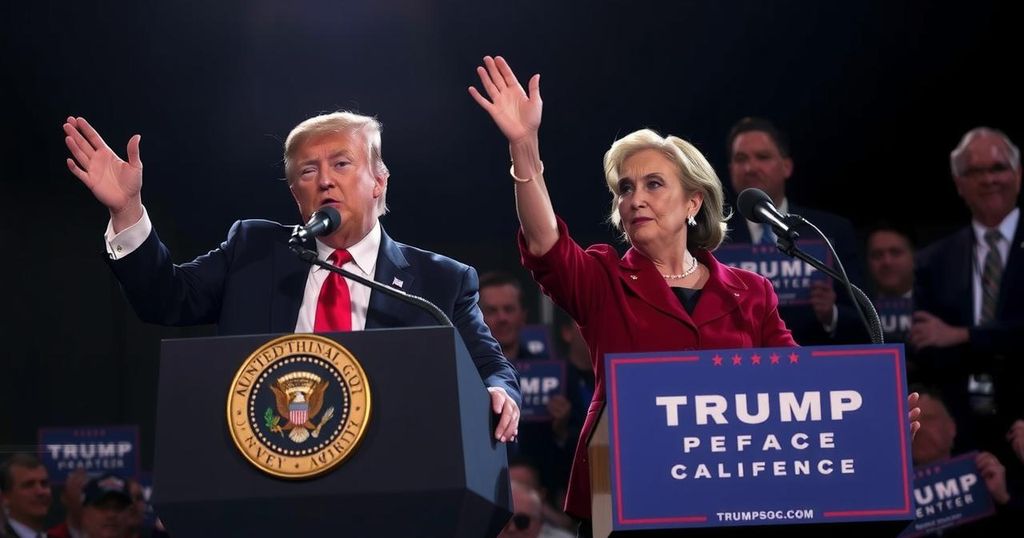Trump, Virginia GOP Hold Final Rally Before Election Day

Republican presidential nominee Donald Trump rallied in Salem, Virginia, on the eve of Election Day, attracting thousands despite challenging poll numbers indicating a deficit against Vice President Kamala Harris. Leading Virginia Republican figures echoed his claims of economic recovery and positioned Trump as a defender against perceived societal threats, particularly regarding immigration and LGBTQ+ issues, emphasizing the election’s moral significance.
In a significant show of support just three days before Election Day, Republican presidential candidate Donald Trump held a rally in Salem, Virginia, alongside notable Republican figures from the state. Despite a challenging polling landscape—one which suggests Trump is trailing Vice President Kamala Harris by 10 points—thousands of supporters gathered at the Civic Center, with many unable to gain entry due to overwhelming demand. During the event, speakers emphasized Trump’s candidacy as a solution to various pressing national issues, with a consistent theme portraying illegal immigration negatively and attributing economic woes to the current administration’s policies. Trump himself delivered a lengthy address, claiming he possesses the capability to remedy the nation’s economic challenges and restore glory to the country. “Every problem facing us can be solved, but now the fate of our nation is in your hands,” he proclaimed emphatically. Polls indicate that Virginia is not currently a target state for Trump, with previous losses in the state contributing to skepticism regarding his chances this election. Nonetheless, Trump expressed confidence, stating his intention to win not only Virginia but other traditionally Democratic states such as California, contingent upon what he termed “an honest election.” The prelude to Trump’s speech featured local politicians demonizing certain social issues, particularly regarding transgender rights and immigration, with the rhetoric suggesting a battle between good and evil. This ideology resonated throughout the speeches, reinforced by frequent religious references. Virginia Governor Glenn Youngkin called upon the audience to take collective action at the polls, framing the election as pivotal for the direction of the state and the nation. He urged participants to mobilize others, adhere to their faith, and ensure their votes were cast effectively. Youngkin’s remarks hinted at the significant cultural differences underpinning the election, emphasizing contentious topics such as educational reform regarding race and LGBTQ+ rights. Amidst the crowd’s anticipation, Trump finally took the stage after a lengthy wait. His remarks were punctuated by his signature stylistic delivery, reinforcing his position as the Republican leader. Figures such as Virginia House Speaker Don Scott critiqued Youngkin’s changing allegiance from a hesitant supporter of Trump to a current advocate, indicating a shift in the political landscape within the Republican party.
The rally held by Donald Trump in Roanoke, Virginia, in the lead-up to the election serves as a microcosm of the current political climate within the Republican Party. Trump’s campaign efforts are marked by a blend of traditional conservatism with populist messaging, capitalizing on themes that resonate strongly with his base, including opposition to immigration and a commitment to economic revitalization. Virginia’s changing political demographics, especially its move towards more Democratic alignments in recent years, have posed challenges for Republican candidates, making the state less of a focus in the upcoming elections. However, the state’s historical significance as a battleground adds complexity to the campaign dynamics.
In conclusion, Donald Trump’s rally in Salem illustrates the ongoing tensions and fervent support that characterize his campaign. Despite unfavorable polling data in Virginia, the event achieved a notable turnout and provided a platform for Republican leaders to align with Trump’s messaging. As the election approaches, the discourse surrounding cultural and economic issues continues to shape voter perspectives and political strategies within the Republican Party, highlighting the critical engagement of its constituents ahead of a pivotal election.
Original Source: www.vpm.org







